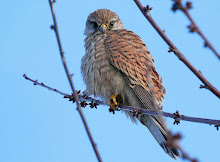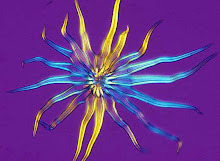Sea anemones belong to a class of animals known to science as the Anthozoa – a word that literally means ‘flower animal’, and these beadlet anemones (Actinia equina), photographed on the beach at Warkworth in Northumberland, are typically flower-like. There’s some debate about whether the green individuals like the one in the photo below are just a colour form or a separate species. On the upper shore the purple form is by far the commonest.
The ring of tentacles encircling the mouth are equipped with barbed stinging cells called nematocysts, triggered when prey brushes against them, that inject paralysing poison into their victim, which is then manoeuvred through the mouth and into the stomach by the tentacles. The nematocysts of British sea anemones are too small to penetrate human flesh but you can feel the barbs. Poke you finger into a beadlet anemone and it feels sticky – the 'stickiness' is due to the microscopic barbs hooking onto your skin. Incidentally, these pictures were taken with the little Pentax W20 pocket camera, that I use for most of the pictures on this blog, fully submerged in the rockpool; so far the manufacturer’s claim that it’s waterproof has proved to be sound. It’s ideal for taking pictures of animals in rockpools, avoiding the problems of reflections that are inevitable when photographing through the surface.
One of the finest books on sea anemone’s was Philip Henry Gosse’s Actinologia Britannica; A History of the British Sea-Anemones and Corals, published in 1860 and illustrated with beautiful hand-coloured plates showing all the then-known British species. A copy of this would now cost you somewhere between £250 and £600, depending on condition, but you can read the book for nothing on the web (or even download a pdf of the whole book) at http://www.archive.org/details/actinologiabrita00goss
For some more up-to-date information on beadlet anemone, take a look at http://www.marlin.ac.uk/speciesinformation.php?speciesID=2359
Thursday, September 17, 2009
Subscribe to:
Post Comments (Atom)

























No comments:
Post a Comment
Note: Only a member of this blog may post a comment.